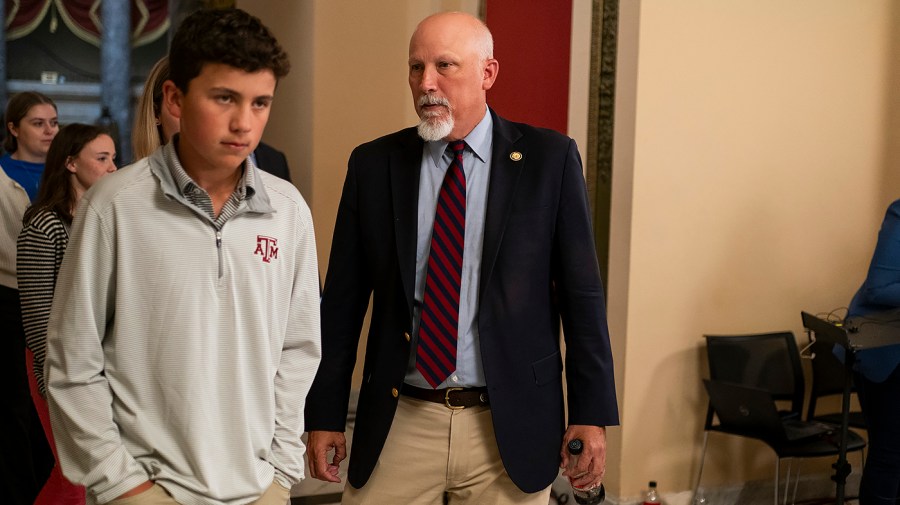Rep. Chip Roy of Texas has officially announced his candidacy for Texas attorney general, spearheading a significant shift within the House Freedom Caucus as several of its members pursue higher office. This wave of departures could reshape the dynamics of the House Republican Conference, particularly its more hard-line elements, as the midterm elections approach.
Roy’s announcement follows similar moves by other prominent members of the Freedom Caucus. Andy Biggs of Arizona, Byron Donalds of Florida, and Ralph Norman of South Carolina are all running for governor, while Barry Moore of Alabama has recently launched a Senate bid. Additionally, Andy Ogles from Tennessee is seeking an appointment to the Senate should Marsha Blackburn win the governorship.
The exodus of these influential figures may create opportunities for a more harmonious Republican Party. Derrick Van Orden, a Republican from Wisconsin, commented, “I wish Chip Roy nothing but the best. I hope he does very well. The outcome of Chip leaving is a more productive Congress.” He characterized Roy as a “contrarian” and “obstructionist,” suggesting that his departure could ease tensions within the party.
Despite such criticisms, many in GOP leadership regard Roy as a vital link between the Freedom Caucus and mainstream Republican members. Stephanie Bice, a representative from Oklahoma, emphasized the importance of collaboration, stating, “My hope is that we’ll have members from the Freedom Caucus step up to fill that void, because there’s a need for us to continue to work together.”
Roy has played a pivotal role in the Freedom Caucus, which has often resisted GOP leadership and delayed key votes in recent years. He embodies the caucus’s strategy of leveraging influence to secure conservative policy victories. Following the tumultuous election of Kevin McCarthy as Speaker in January 2023, Roy and Ralph Norman secured influential positions on the House Rules Committee, which oversees major legislation before it reaches the floor.
Critics within Congress have questioned the effectiveness of the Freedom Caucus. This past summer, Roy and his fellow fiscal conservatives were the last holdouts on a significant tax bill supported by former President Donald Trump. After prolonged negotiations, they eventually backed the legislation, despite not achieving substantial changes to its provisions. Van Orden referred to Roy as “Flip Roy,” noting a tendency to delay decisions before ultimately supporting bills.
Nonetheless, members of the Freedom Caucus assert that their efforts have pushed legislation further to the right, negotiating for increased spending cuts and expedited expiration of green energy tax credits. Bice recalled working closely with Roy and Donalds on a bipartisan stopgap measure to prevent a government shutdown, acknowledging Roy’s negotiating skills and dedication to his principles.
“Did I always agree with his approach? No,” Bice remarked. “But he fights for what he believes in. I actually think that’s one of the things that has the potential to make him a great attorney general for Texas.”
Roy, formerly a chief of staff to Senator Ted Cruz, is recognized for his strategic acumen and ability to engage in principled policy debates. Wade Miller, executive director of Citizens for Renewing America, praised Roy’s unique combination of policy knowledge and negotiation skills.
Observers suggest that GOP leadership, including Speaker Mike Johnson, may welcome the departures of Roy and other Freedom Caucus members. While Johnson has not publicly commented on Roy’s candidacy, sources indicate that Roy notified party leadership of his intentions.
Roy’s complex relationship with Trump has also drawn attention. In December, Trump invited a primary challenger to Roy’s campaign after the congressman opposed raising the debt ceiling without accompanying spending restrictions. Yet, supporters within the Freedom Caucus, such as Keith Self and Lauren Boebert, have framed Roy as a steadfast advocate for Trump’s agenda.
As the Freedom Caucus prepares for a transformation, Tim Reitz, executive director of the group, expressed optimism about the future: “We’re losing a lot of great guys with institutional knowledge and experience, but we fortunately have a lot of rising stars coming up who will be the next generation of conservative fighters.”
Since its establishment in 2015, the Freedom Caucus has produced several prominent figures who have transitioned to higher positions, including Mark Meadows and Ron DeSantis. Research indicates that Freedom Caucus members are significantly more likely to run for higher office than their non-Freedom Caucus counterparts, with approximately 17% having pursued such paths compared to just 3% of other Republicans.
Looking ahead, some members, such as freshman Rep. Brandon Gill of Texas, are being touted as potential future leaders within the group. Miller noted that the Freedom Caucus has cultivated a network of legislators aligned with its vision, suggesting continued influence on policy outcomes in Washington.
Roy framed the ongoing changes within the Freedom Caucus as a transition towards a new generation of Republican leaders. “A new generation is emerging with @freedomcaucus,” he posted on social media. “And battle-tested fighters are now going home to deliver alongside @realDonaldTrump. The team is growing.”
